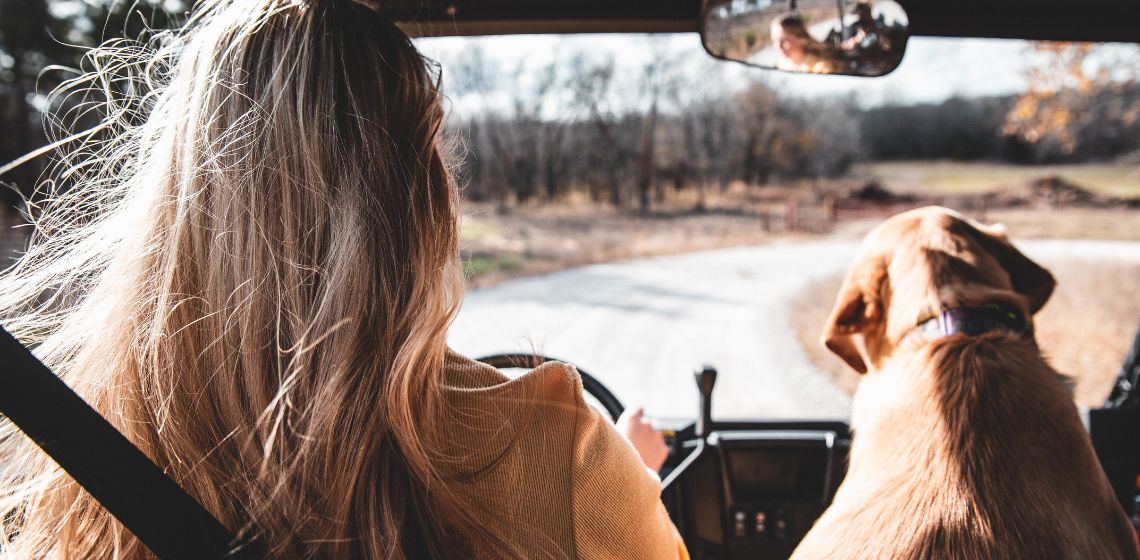Table of Contents
Pre-trip planning
Health Check-Up: Before hitting the road, schedule a visit to your veterinarian. Ensure that your puppy is up-to-date on vaccinations and has a clean bill of health. Discuss your travel plans with your vet to address any specific concerns or requirements, such as motion sickness medication or health certificates.
Microchipping and ID Tags: Make sure your puppy has proper identification. Microchipping is a permanent form of identification, and it’s wise to attach an ID tag with your contact information to their collar. In case your pet gets lost during the trip, these measures increase the chances of a safe reunion.
Puppy essentials packing list
Food and Water: Pack enough food and water for the entire trip, plus a little extra in case of delays. Bring your puppy’s regular food to avoid digestive issues, and consider collapsible bowls for easy feeding and drinking on the go.
Crate or Carrier: A crate or carrier is essential for your puppy’s safety and comfort during the journey. Ensure it’s appropriately sized and well-ventilated, with a comfortable blanket or bedding inside for your pup to snuggle on.\
Leash and Harness: Keep a sturdy leash and harness on hand for potty breaks and walks. A well-fitted harness can also help secure your puppy safely in the car.
Waste Cleanup Supplies: Pack poop bags, cleaning wipes, and paper towels for quick clean-ups. Traveling responsibly means cleaning up after your puppy to keep public areas clean.
Medications and First Aid Kit: If your puppy requires any medications, bring them along with a pet-specific first aid kit. Include items like bandages, antiseptic wipes, and tweezers for removing splinters or ticks.
Comfort Items: To help your puppy feel secure, bring along their favorite toys, a blanket with their scent, and maybe even a piece of your clothing. Familiar objects can reduce anxiety during the journey.
Restraint System: For your puppy’s safety while driving, invest in a pet seat belt or a proper car safety harness. These devices secure your puppy and prevent distractions while you’re on the road.
Training and socialization
Pre-Trip Training: If your puppy isn’t used to car rides, start with short drives to get them accustomed to the experience. Gradually increase the duration and introduce positive reinforcement, such as treats and praise, to create a positive association with car travel.
Socialization: Before your trip, expose your puppy to various environments, people, and other animals. This will help them adapt better to new places and situations encountered during the road trip. Ensure your puppy is well-behaved around other dogs, as you may encounter them at rest stops or pet-friendly destinations.
Safety tips during the journey
Secure Your Puppy: Never allow your puppy to roam freely in the car. Secure them in a crate, carrier, or with a safety harness. This prevents them from becoming a distraction to the driver and keeps them safe in case of sudden stops or accidents.
Adequate Ventilation: Ensure your puppy has proper ventilation during the trip. Crack a window slightly to allow fresh air to circulate, but make sure they can’t stick their head or paws out. Don’t rely on air conditioning alone, as it can be insufficient on hot days.
Frequent Breaks: Plan for regular breaks every 2-3 hours to allow your puppy to stretch their legs, relieve themselves, and have a drink of water. Use designated rest areas or pet-friendly stops to ensure your puppy’s safety.
Never Leave Your Puppy Alone: Under no circumstances should you leave your puppy unattended in the car, even for a few minutes. Temperatures can rise quickly in a closed vehicle, leading to heatstroke, which can be fatal.
Choosing pet-friendly accommodations
Research Pet-Friendly Hotels: Before booking accommodations, research and select pet-friendly hotels or vacation rentals. Check their pet policies, fees, and any restrictions on pet size and breed. Book in advance to secure your stay.
In-Room Comfort: Ensure that your puppy is comfortable in the hotel room. Set up their crate, bring their familiar bedding and toys, and make the environment as welcoming as possible.
Respect House Rules: Follow the hotel’s pet-specific rules, such as leash requirements in common areas and designated pet relief areas. Be a responsible pet owner to maintain a positive reputation for fellow travelers.
Exploring pet-friendly destinations
Research Pet-Friendly Attractions: Plan your road trip around pet-friendly destinations and attractions. Many national parks, beaches, and outdoor recreational areas allow dogs on leashes. Research in advance to ensure that your chosen stops accommodate pets.
Check Local Regulations: Familiarize yourself with local leash laws and other regulations regarding pets. Always have your puppy on a leash unless you’re in a designated off-leash area.
Pet Etiquette: Practice good pet etiquette when visiting public places. Clean up after your puppy, keep them well-behaved, and respect other visitors’ space and comfort.
Health and hygiene
Hydration: Ensure your puppy stays adequately hydrated throughout the trip. Offer water at regular intervals, especially in warmer weather, to prevent dehydration.
Tick and Flea Prevention: If traveling to areas where ticks or fleas are prevalent, use appropriate preventative measures. Consult with your vet for advice on the best products for your puppy’s specific needs.
Food and Feeding: Stick to your puppy’s regular feeding schedule as much as possible. Avoid feeding them right before the car ride to reduce the risk of motion sickness.
Comfort Stops: When making rest stops, provide your puppy with opportunities for exercise and potty breaks. Carry a travel-sized pet waste disposal kit to clean up after them.
Stay attentive to your puppy’s needs
Watch for Signs of Stress: Pay attention to your puppy’s behavior during the trip. Signs of stress or discomfort may include excessive panting, whining, restlessness, or drooling. If your puppy appears distressed, pull over and assess their needs.
Comfort and Reassurance: Offer your puppy comfort and reassurance as needed. Sometimes, a gentle stroke or a soothing voice can help calm nerves and anxiety.
Travel Safety Kit: Keep a travel safety kit in your car, which includes items like a flashlight, a spare leash and collar, a blanket, and extra food and water. This kit can be a lifesaver in unexpected situations.
Traveling with a puppy in your car can be a rewarding experience when you prioritize their safety and comfort. Proper planning, training, and adhering to responsible pet-owner practices are key to a successful pet-friendly road trip. Remember to consult with your veterinarian, pack essentials, and be prepared for any situation that may arise. With these tips in mind, you and your furry companion can create lasting memories and enjoy a safe and enjoyable journey together.

Emily is a veterinary technician with over 6 years of experience in the field. She knew since she was a child that she was meant to work with animals. She started her career working in veterinary ophthalmology and has since worked her way to general practice. Emily now works as a surgical technician working in the operating room. When not at work, Emily spends her time with her husband and her small zoo of 3 dogs, 4 cats, 5 ducks, and 5 chickens.








